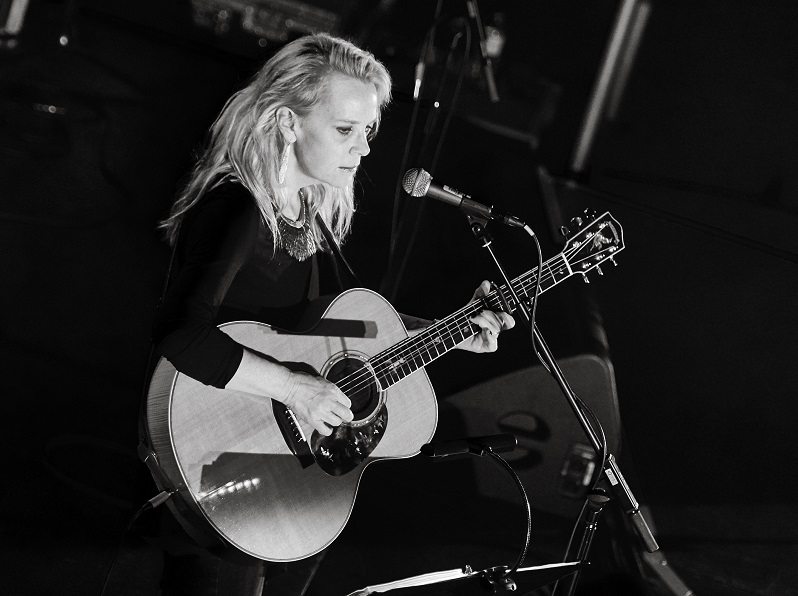Mary Chapin Carpenter's new album Sometimes Just the Sky revisits her 30-plus year career with a stripped-down revision of one song from each prior album, along with a new track. What better time to revisit her relationship with country music, considering Nashville's role in her early-'90s run of chart and award show success.
From 1987's Hometown Girl on, Carpenter resounded with country music audiences without trying to sound or look the part, culminating with five Grammy wins between 1992 through 1995.
"I think you have to go back to the time in the late '80s when there was this sort of moment where it seemed like there was this enormous umbrella for which a lot of different kinds of artists from a lot of different places musically and artistically were being played and presented in country music," Carpenter tells Wide Open Country. "You had people like Lyle Lovett, Steve Earle, Rosanne Cash and Joe Ely and all of these incredible artists and singers and songwriters, and some more traditional artists as well. I think I sort of got swept in."
With Nashville's support, she went on to impact popular music as a whole with such hits as "He Thinks He'll Keep Her," a co-write with Hall of Famer Don Schlitz, and a cover of fellow outside-the-box thinker Lucinda Williams' "Passionate Kisses."
Nowadays, Carpenter has at least one thing in common with the current batch of critically-acclaimed country and folk songwriters — she really digs John Prine.
"If I had my way, he'd be on Mount Rushmore," she says. "He's making records as great today as he did when he first came out. People like John Prine and Emmylou Harris, those kinds of careers are things we should revere. They still do vibrant work, they've always followed their muse and they've never been restrained by commercial considerations. It's all about the art. If that's not your number one concern, then you shouldn't be doing it."
When asked to expand on her love of Harris, Carpenter continued heaping praise on her creative forerunners.
"She's a hero of mine," Carpenter says. "Whenever I post something about Emmylou Harris on social media, I can't help myself. It's hashtag 'Emmylou for President.' Seriously, she is a hero. For everything she does, she approaches her life and her work with fearlessness and dignity. She puts her art first, she speaks her mind and advocates causes she believes in. She's an example of how to be an artist in this world we live in."
Read More: Rooted in Country: Caroline Spence on Mary Chapin Carpenter's 'The Hard Way'
Like Harris' music, Carpenter's new album is both fearless and dignified. Although the songs span multiple decades, folksy new interpretations make them sound timeless. That's certainly true of opening track "Heroes and Heroines," a Western-themed song bemoaning the lack of men and women with the same character as Prine and Harris. It's the oldest song on the album, yet its lyrics could easily be about today's social climate or the music business.
She recorded the album in England at Peter Gabriel's Real World Studios with accomplished producer Ethan Johns (The Jayhawks, Ryan Adams). Reflecting on that experience had Carpenter fighting tears while remembering the long list of musicians, producers and others involved in an eventful 30-year run, marked by good timing and great songs.
"I was as shocked as anybody that my life turned out the way it did, but it wasn't some sort of declaration or strategy," she says. "It's just something that happened organically. And I think the music business, like anything else, is a cyclical thing. There are times when maybe it contracts and isn't as wide-ranging as it can be, and there's times when it opens up and there's a lot of different things happening. I think it's always been like that, and it continues to be."
As Carpenter begins another decade as a performer, she's less dependent on a cycle that, for the most part, has been favorable more often than not.
"It's such a different world now than it was when I started out making records," she says. "The game-changer, of course, is technology. It's as if the gatekeepers don't really hold the power. Anyone can hang blankets in their bedroom and make a record and put it on YouTube and discover an audience that way. Or rather, an audience can discover that artist. They can nurture a career that way without having to sign to a label. It's a very DIY world now. It's very exciting."
Now Watch: Carson McHone Performs 'Good Time Daddy Blues'




